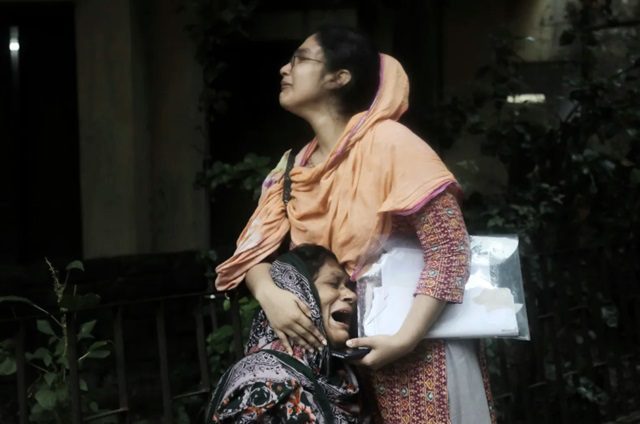BTN News: Bangladesh is slowly getting back to normal after over a week of chaos due to student protests about job quotas. Nearly 200 people have died during this time. Some internet services are back, and a few offices have reopened, giving a sense of normal life.
In Dhaka, the capital, many cars are on the streets after the curfew was lifted for seven hours. Internet access is still limited in most parts of the country. However, broadband connections have been restored in some areas of Dhaka and Chattogram, the second-largest city. Offices and banks operated for a few hours on Wednesday.
According to the Bengali newspaper Prothom Alo, nearly 200 people have died since the violence began on July 16. The Associated Press has not confirmed these figures through official sources. Mohammad Ali Arafat, the Information and Broadcasting official, said in a press conference that the official death count would be given after a judicial inquiry. A committee led by a Supreme Court judge has been formed to investigate the deaths.
Arafat spoke during a visit to see the damage caused by a fire at the Bangladesh Television headquarters in Dhaka. Despite promises that protesting students would not face legal action or harassment, media reports say that over 1,400 people have been detained across the country. Among those detained are opposition supporters, many of whom are in jail waiting for further legal action. Prime Minister Sheikh Hasina promised that those responsible for the violence would be held accountable.
Schools and educational institutions remain closed until further notice. The protests started on July 15 when police clashed with students. The students were asking for an end to a system that reserved 30% of government jobs for families of veterans from the 1971 war of independence. The situation got worse when the opposition Bangladesh Nationalist Party (BNP) and the conservative Jamaat-e-Islami party supported the protests. This led to more violence and attacks on government buildings in Dhaka.
On Sunday, the Supreme Court ordered that the quota for veteran families be reduced to 5%. This means that 93% of government jobs will now be given based on merit. The remaining 2% will be reserved for ethnic minorities, disabled people, and transgender individuals. The government accepted the Supreme Court’s decision and issued a circular on Tuesday to enforce the new quota system. Prime Minister Hasina’s government welcomed the ruling and is ready to implement it.
Protesters took some time to respond to the Supreme Court’s decision. On Tuesday, they said the ruling and the government’s circular met their demands. However, they insisted that the government must be held accountable for the deaths and injuries during the protests.
These protests are the biggest challenge to Prime Minister Hasina since she won a fourth consecutive term in January. The elections were boycotted by major opposition groups. The government had closed universities, cut off internet access for several days, and told people to stay indoors to stop the unrest.
Critics say that the quota system is unfair and benefits Hasina’s supporters. Her Awami League party led the independence movement. Protesters want a system based on merit instead of quotas. Hasina has defended the quotas, saying that veterans deserve respect for their contributions during the war against Pakistan.
Both the Awami League and the BNP have blamed each other for the political chaos and violence. This rivalry has often caused problems in the country’s political scene.
Key Developments:
- Internet and Office Reopenings: Limited internet services are back, and some offices have reopened, signaling a return to normalcy.
- Casualties: Nearly 200 people have died since the protests began, according to local media.
- Government Response: A judicial inquiry committee has been formed to investigate the deaths, and a new quota system based on merit has been implemented.
- Detentions: Over 1,400 people have been detained, including opposition supporters, many of whom are awaiting further legal action.
- Educational Institutions: Schools and universities remain closed amid the unrest.
Background of the Protests That Started Due to Student Discontent with Job Quotas
The unrest began as students protested against a quota system that reserved 30% of government jobs for families of 1971 war veterans. The Supreme Court’s recent ruling to reduce this quota to 5% has been welcomed by protesters, although they demand accountability for the violence.
Implications of the Recent Developments on Job Quotas in Bangladesh
The recent changes mark a significant shift in Bangladesh’s job allocation system, moving towards a merit-based approach. This change could affect the political dynamics in the country, with the government and opposition continuing to blame each other amid a backdrop of long-standing political rivalry.
Conclusion on the Future Course of Actions Required to Address the Issues Raised by the Protests
While Bangladesh slowly returns to normal, the aftermath of the protests remains a reminder of the deep political tensions and the need for a fair system. The government’s response and the judicial inquiry’s findings will be crucial in shaping the country’s future.
By addressing the protesters’ demands, Bangladesh has taken a step towards reform. However, it is important to address the root causes of the unrest and ensure justice for those affected by the violence.


